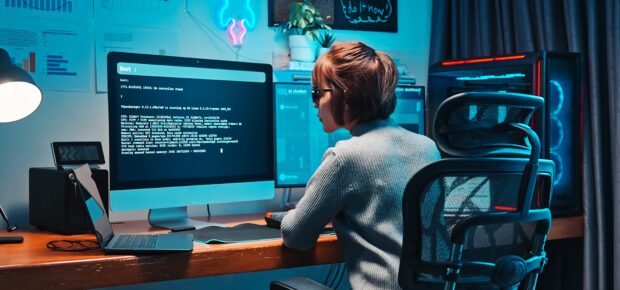October 26, 2023
Companies everywhere want to harness AI’s potential.
But here’s the catch: integrating AI into existing work isn’t as straightforward as flipping a switch. Integrating other technologies – from cloud computing to IoT devices – has often been met with mixed success. Some evidence suggests that digital transformation initiatives – a broad term used to describe the digitization of services – have astoundingly high failure rates, meaning they didn’t meet expectations, exceeded costs, blew through deadlines or in some cases were abandoned.
Introducing advanced technology like AI may be more difficult. So what’s the realistic roadmap for adoption? How will companies use artificial intelligence in the coming years?
In “The Impact of Technology in 2024 and Beyond: an IEEE Global Study,” a recent survey of global technology leaders, 47% of respondents said they see difficulty integrating AI into existing workflows as one of the top three concerns when it comes to using generative AI in 2024.
“New use cases of generative AI and their integration into the general architecture may turn to be serious challenges,” said IEEE Life Senior Member Raul Colcher. “Good business analysts and system integrators will be essential.”
Skills Companies Need
For one thing, the technology is so new, there are few people with the expertise to work with it.
Additional data from the survey illuminate the challenge. Respondents were asked to list the top skills they were looking for in candidates for AI-related roles. A variety of technical skills comprised the list, but various soft skills also ranked high.
“Prompt engineering, creative thinking and the ability to verify AI’s deliverables – these three skills are what you need to generate meaningful outcomes with the aid of generative AI,” said Yu Yuan, IEEE Senior Member.
Despite widespread focus on generative AI throughout the current year, the percentage of respondents who said they had introduced or were planning to introduce tools that used natural language processing in the coming year ticked up from 67% in 2023 to 70% in 2024, according to the survey.
Most Likely To Adopt
The industries most likely to adopt and use AI solutions tend to be in sectors already reliant on technical skills. According to the survey, among top uses of AI in the coming year will be real time cybersecurity, increasing supply chain efficiency, aiding and accelerating software development, automating customer service and the speeding up screening of job applicants. Here’s what our IEEE Impact Creators have to say:
Cybersecurity:
“Realistically, the use of AI in cybersecurity will help to reduce the punishing cognitive load on tier one analysts in the security operation center,” said IEEE Senior Member Kayne McGladrey. “Rather than having to comb through a needlestack looking for a needle, AI promises to automate much of the correlation across vast amounts of data that humans struggle with.”
Software development:
“One of the biggest bottlenecks in technology is the availability of human resources for coding. In many cases, there is intellectual work with high added value, but many of the software development activities are relatively simple and should be automated soon,” said IEEE Senior Member Carmelo José Albanez Bastos Filho.
Customer Service:
“A depressingly high level of customer service interactions are bad,” said IEEE Senior Member Nicholas Napp. “A mixture of poor training, poor funding and poorly aligned incentives create a terrible environment for success. As a result, simple issues are often left unresolved, resulting in waste, unhappy customers and poor outcomes. Anything that can meaningfully improve the customer service experience should be welcomed.”
Learn More: The IEEE Computer Society has developed a comprehensive list of AI resources, including links to ethical guides and salary information. Check it out here.





 Meaningful Momentum or Running in Place?
Meaningful Momentum or Running in Place? AI Through Our Ages
AI Through Our Ages Liquid Infrastructure: Our Planet's Most Precious Resource
Liquid Infrastructure: Our Planet's Most Precious Resource The Impact of Technology in 2025
The Impact of Technology in 2025 Quantum and AI: Safeguards or Threats to Cybersecurity?
Quantum and AI: Safeguards or Threats to Cybersecurity? Why AI Can't Live Without Us
Why AI Can't Live Without Us Bits, Bytes, Buildings and Bridges: Digital-Driven Infrastructure
Bits, Bytes, Buildings and Bridges: Digital-Driven Infrastructure Impact of Technology in 2024
Impact of Technology in 2024 Emerging AI Cybersecurity Challenges and Solutions
Emerging AI Cybersecurity Challenges and Solutions The Skies are Unlimited
The Skies are Unlimited Smart Cities 2030: How Tech is Reshaping Urbanscapes
Smart Cities 2030: How Tech is Reshaping Urbanscapes Impact of Technology 2023
Impact of Technology 2023 Cybersecurity for Life-Changing Innovations
Cybersecurity for Life-Changing Innovations Smarter Wearables Healthier Life
Smarter Wearables Healthier Life Infrastructure In Motion
Infrastructure In Motion The Impact of Tech in 2022 and Beyond
The Impact of Tech in 2022 and Beyond Cybersecurity, Technology and Protecting Our World
Cybersecurity, Technology and Protecting Our World How Technology Helps us Understand Our Health and Wellness
How Technology Helps us Understand Our Health and Wellness The Resilience of Humanity
The Resilience of Humanity Harnessing and Sustaining our Natural Resources
Harnessing and Sustaining our Natural Resources Creating Healthy Spaces Through Technology
Creating Healthy Spaces Through Technology Exceptional Infrastructure Challenges, Technology and Humanity
Exceptional Infrastructure Challenges, Technology and Humanity The Global Impact of IEEE's 802 Standards
The Global Impact of IEEE's 802 Standards Scenes of our Cyber Lives: The Security Threats and Technology Solutions Protecting Us
Scenes of our Cyber Lives: The Security Threats and Technology Solutions Protecting Us How Millennial Parents are Embracing Health and Wellness Technologies for Their Generation Alpha Kids
How Millennial Parents are Embracing Health and Wellness Technologies for Their Generation Alpha Kids Space Exploration, Technology and Our Lives
Space Exploration, Technology and Our Lives Global Innovation and the Environment
Global Innovation and the Environment How Technology, Privacy and Security are Changing Each Other (And Us)
How Technology, Privacy and Security are Changing Each Other (And Us) Find us in booth 31506, LVCC South Hall 3 and experience the Technology Moon Walk
Find us in booth 31506, LVCC South Hall 3 and experience the Technology Moon Walk Virtual and Mixed Reality
Virtual and Mixed Reality How Robots are Improving our Health
How Robots are Improving our Health IEEE Experts and the Robots They are Teaching
IEEE Experts and the Robots They are Teaching See how millennial parents around the world see AI impacting the lives of their tech-infused offspring
See how millennial parents around the world see AI impacting the lives of their tech-infused offspring Take the journey from farm to table and learn how IoT will help us reach the rising demand for food production
Take the journey from farm to table and learn how IoT will help us reach the rising demand for food production Watch technical experts discuss the latest cyber threats
Watch technical experts discuss the latest cyber threats Explore how researchers, teachers, explorers, healthcare and medical professionals use immersive technologies
Explore how researchers, teachers, explorers, healthcare and medical professionals use immersive technologies Follow the timeline to see how Generation AI will be impacted by technology
Follow the timeline to see how Generation AI will be impacted by technology Learn how your IoT data can be used by experiencing a day in a connected life
Learn how your IoT data can be used by experiencing a day in a connected life Listen to technical experts discuss the biggest security threats today
Listen to technical experts discuss the biggest security threats today See how tech has influenced and evolved with the Games
See how tech has influenced and evolved with the Games Enter our virtual home to explore the IoT (Internet of Things) technologies
Enter our virtual home to explore the IoT (Internet of Things) technologies Explore an interactive map showcasing exciting innovations in robotics
Explore an interactive map showcasing exciting innovations in robotics Interactively explore A.I. in recent Hollywood movies
Interactively explore A.I. in recent Hollywood movies Get immersed in technologies that will improve patients' lives
Get immersed in technologies that will improve patients' lives